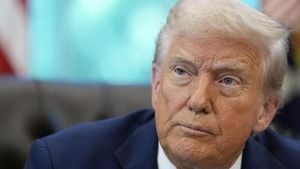On Friday, August 22, 2025, the Trump administration made public the transcripts and audio recordings of a headline-grabbing interview between Ghislaine Maxwell and Deputy Attorney General Todd Blanche. The release, which came after mounting political pressure, offers a rare, unfiltered look into Maxwell’s perspective on her own relationship with former President Donald Trump, the late Jeffrey Epstein, and the swirl of scandal that continues to haunt all involved.
The timing of these disclosures is anything but coincidental. According to The Washington Post, the interview took place in July 2025, just weeks before the administration faced growing calls to release all information it holds about Epstein and his notorious network. Epstein, who died in 2019 while being held on sex trafficking charges—a death ruled a suicide by the medical examiner—remains a figure of intense public scrutiny. Maxwell, convicted and serving a 20-year sentence for her role in Epstein’s crimes, has become a central player in the search for answers and accountability.
During the interview, Blanche—who, as The New York Times noted, was formerly Trump’s personal defense lawyer—pressed Maxwell on a series of topics directly related to the former president. The transcripts reveal that Maxwell, perhaps unsurprisingly, painted Trump in a flattering light. "I actually never saw the President in any type of massage setting. I never witnessed the President in any inappropriate setting in any way. The President was never inappropriate with anybody. In the times that I was with him, he was a gentleman in all respects," Maxwell stated, as reported by The Washington Post.
Maxwell’s remarks did not stop at mere denial of wrongdoing. She went further, expressing admiration for Trump. According to the transcripts, she told the Justice Department she "admired President Donald Trump." This statement, made while she was actively seeking leniency or a pardon from the president, is raising eyebrows among critics and legal analysts alike. The context is hard to ignore—Maxwell’s future depended, at least in part, on Trump’s goodwill, giving her a clear incentive to speak favorably about him.
But the interview wasn’t just about Maxwell’s personal impressions. Blanche also questioned her about a peculiar artifact from Epstein’s past: a birthday book compiled for his 50th birthday. This book, which became a subject of legal wrangling after The Wall Street Journal reported it contained a "bawdy" letter allegedly from Trump, was thrust into the spotlight again. The Journal described the letter as containing "several lines of typewritten text framed by the outline of a naked woman, which appears to be hand-drawn with a heavy marker. A pair of small arcs denotes the woman’s breasts, and the future president’s signature is a squiggly ‘Donald’ below her waist, mimicking pubic hair."
Trump has vehemently denied any involvement, telling reporters, "This is not me. This is a fake thing. It’s a fake Wall Street Journal story." When Blanche asked Maxwell directly, "Do you remember President Trump submitting a letter or a card or a note?" she replied, simply, "I don’t." This denial, while unequivocal, has done little to quell speculation, especially given the politically charged atmosphere surrounding the case.
The interview and subsequent release of its transcripts did not occur in a vacuum. As The Washington Post highlighted, the Justice Department’s decision to publicize these materials followed a period of intense backlash over its refusal to release all Epstein-related documents. Lawmakers on both sides of the aisle have demanded greater transparency, citing the public’s right to know the full extent of Epstein’s connections and the possibility of broader criminal culpability. The administration’s selective release of materials—while significant—has not fully satisfied these demands, and many are still calling for a complete accounting.
After meeting with Blanche, Maxwell’s circumstances changed. She was transferred to a minimum-security facility, a move that some legal observers interpret as a gesture of leniency, perhaps in recognition of her cooperation or as a result of ongoing legal negotiations. Meanwhile, Maxwell continues to fight her conviction, with a petition currently pending before the Supreme Court in hopes of overturning her 20-year sentence. Her legal team remains vocal and combative. In a statement responding to the release of the transcripts and audio, Maxwell’s lawyer said, "We are thankful to the Department of Justice and to Todd Blanche for making these tapes and transcripts public so that people can judge for themselves."
The public reaction to the release has been predictably polarized. Supporters of the former president have seized on Maxwell’s statements as vindication, arguing that her denial of any inappropriate conduct by Trump should put longstanding rumors to rest. Skeptics, however, point out the obvious incentive for Maxwell to curry favor with Trump, especially given her ongoing efforts to secure a pardon or sentence reduction. As one commentator put it, "Maybe that’s true. Maybe it’s not. In any event, she offered her statements while seeking a pardon from the president, and she has an obvious incentive to say favorable things about the president."
The broader political context cannot be ignored. The Trump administration’s handling of Epstein-related information has been a flashpoint for controversy, with critics accusing officials of stonewalling and selectively disclosing details for political gain. The release of the Maxwell interview may be seen as an attempt to deflect criticism or to shape the public narrative at a critical juncture. At the same time, it underscores the enduring power of the Epstein scandal to upend careers, reputations, and even the trajectory of American politics.
Meanwhile, the families of Epstein’s victims and their advocates continue to demand answers. For them, the release of a single interview—however revealing—falls short of the full transparency they have long sought. As the legal and political battles grind on, the central questions remain unresolved: Who knew what, and when? Who, if anyone, will be held accountable beyond Epstein and Maxwell themselves?
As the dust settles from the latest revelations, one thing is clear: the tangled saga of Jeffrey Epstein, Ghislaine Maxwell, and their powerful associates is far from over. The newly released transcripts offer a window into the high-stakes maneuvering behind the scenes, but for many Americans, they are just another chapter in a story that continues to shock and confound.




